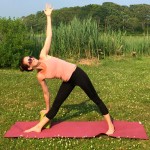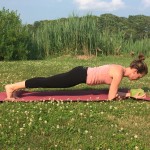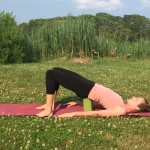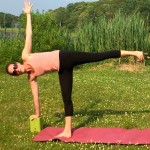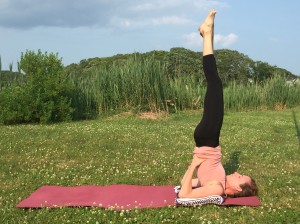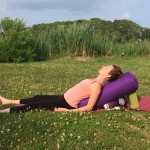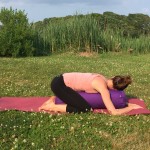Props, Props, Props…I love Props. Props can enhance our practice on many levels, but the use of props can leave many of us feeling confused. Possibly asking one of the following questions:
- “If I grab a block have I outed myself as a newbie?”
- “Why does everyone else seem to know what to grab?”
- “What the hell is all that stuff and why do I need it?”
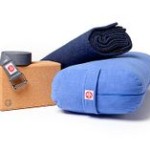
Manduka
That’s what I am here to clarify.
In many yoga classes, teachers may leave it up to the student to decide which, if any props to use. Other teachers may list 4 or 5 things to bring to your mat and in some classes (especially at gyms) there may be limited prop options. It may be up to you to determine what you want to use and when you want to use it.
Push the ego aside because even the most advanced yogis use props. Props help to maintain alignment, enhance restorative experiences, make challenging poses more accessible, and draw attention to specific body regions. The various shapes that our bodies have also affect alignment in pose. We must adjust the pose to conform to the body, rather than conform the body to fit the pose. Whether we need to loosen tight muscles, require a more restorative asana, or are practicing arm balances, props will safely get us to where we want to go.
The 3 B’s: Blocks ◊ Blankets ◊ Bolsters ◊ (oh and) Straps
Blocks
- For standing poses, keep your hand relaxed (no white knuckles), fingers spread and press the block away lifting the weight out of your wrists by engaging your arm muscles.
- Blocks are great reminders for bringing awareness to certain areas. A block between the thighs in bridge prevent the legs from splaying out and prompt us to engage the adductors.
- We don’t all have a specific leg/arm/torso ratio. Those with longs legs with respect to the rest of their body may find it challenging to reach the hand to the floor and maintain the length in the spine while in Trikonasana (triangle pose). A block beneath the bottom hand raises the “ground” creating more freedom to breath.
- Place a block under the sacrum in supported bridge or under the head in a forward fold to enjoy a more restorative pose.
(Pardon my self-timer pics)
- Trikonasana
- Forearm plank
- Supported Bridge
- Half Moon
Blankets
- If your lower back rounds in seated poses, lift your seat up with a folded blanket under your sits bones.
- Keep the body warm during savasana by covering the body with a blanket
- Support the shoulders in sarvangasana and keep the neck safe.
- Place a blanket under your knee in anjanayesana.
Bolster
- Optimize comfort and enhance restoration effects with a supportive bolster.
- A magical component for prenatal yoga, bolsters support the back and pelvis in savasana whether between the thighs or propped under the back.
Strap
- Straps act as extensions for limbs when muscles are tight.
- For taut hamstrings, a strap around the foot allows for a more expansive utthita hasta padangustasana (extended hand-to-big toe pose) and janu sirsasana.
- A strap bridges the gap between hands when shoulders are tight in Gomukhasana and Salabhasana.
